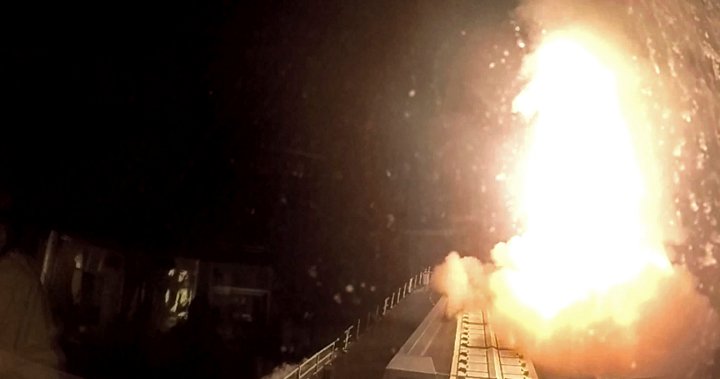Canada is joining a U.S.-led multinational operation to protect commercial vessels traversing the Red Sea amid escalating missile and drone attacks by Iran-backed Houthi rebels in Yemen that have threatened global trade.
A government official told Global News that Canada will be deploying “a handful of personnel” to the region “in the coming days” as part of the mission dubbed Operation Prosperity Guardian. The official declined to provide further details ahead of a formal announcement.
“We will indicate if that contribution evolves, but for now we’re looking at a handful of personnel,” the official said.
U.S. Defense Secretary Lloyd Austin announced the operation early Tuesday while traveling to through the Middle East. He noted during a press conference with Israel’s defence minister in Tel Aviv on Monday that the U.S. was creating an “international coalition to address this threat.”
“These attacks are reckless, dangerous and they violate international law,” he told reporters.
He said he would be discussing the issue when he meets with his Middle Eastern counterparts on Tuesday in Bahrain, which is home to the U.S. Navy’s headquarters in the region.
The seriousness of the attacks, several of which have damaged vessels, has led multiple shipping companies to order their ships to reroute or hold in place and not enter the Bab el-Mandab Strait until the security situation can be addressed.
The United Kingdom, Bahrain, France, Italy, Netherlands, Norway, Seychelles and Spain will join the U.S. and Canada in the new mission, Austin announced. Some of the countries will conduct joint patrols while others provide intelligence support in the southern Red Sea and the Gulf of Aden.
Get the latest National news.
Sent to your email, every day.
About 10 per cent of the world’s good flows through the Red Sea, which spans the Bab el-Mandab Strait in the south to the Suez Canal in the north. It’s one of the most valuable trade routes connecting Asia to Europe and North America.
The Iran-backed Houthis have targeted Israeli-linked vessels since Israel began its military response to Hamas’ brutal attacks on Oct. 7. But those attacks have escalated in recent days, with ballistic missiles and drone-launched projectiles hitting or just missing ships without clear ties.
A Houthi military spokesperson said it launched a drone attack on two cargo vessels in the Red Sea on Monday, the Norwegian-owned M/V Swan Atlantic and the MSC Clara.
Denmark-based operator Uni-Tankers said the Swan Atlantic, which was carrying vegetable oils to France’s Reunion Island off Madagascar in the Indian Ocean, was hit by an unknown object that ignited a small fire. Crew members put it out and all were reported to be safe, the company said. It received military aid and continued on its journey.
The attacks have led companies to pause entry into the waterway or reroute entirely to avoid the area. Marsek, the world’s largest shipping firm, said it was ordering its ships not to enter the Bab el-Mandab Strait indefinitely. MSC and CMA CGM have made similar moves.
London-based oil and gas corporation BP said Monday that it has “decided to temporarily pause all transits through the Red Sea,” including shipments of oil, liquid natural gas and other energy supplies. Much of Europe’s energy resources are shipped through the Red Sea from Asia.
Germany-based Hapag-Lloyd, whose vessel Al Jasrah was fired upon Friday, said Monday it was sending several of its vessels around Africa’s Cape of Good Hope.
“This will be done until the passage through the Suez Canal and the Red Sea will be safe again for vessels and their crews,” a company spokesperson told Global News.
That tactic was taken the last time global trade was disrupted in the region, when the Ever Given ship ran aground and blocked the Suez Canal for nearly a week in 2021. Rerouting around the African continent required additional fuel and other costs that put a strain on shipping companies.
Experts say any long-standing disruption in the Red Sea will have similar impacts on the flow of goods coming in and out of Canada and around the world, and it may take several months to recover, pointing to the Ever Given blockage as an example.
Three U.S. warships — the USS Carney and the USS Mason, Navy destroyers — have been moving through the Bab el-Mandeb Strait daily to help deter and respond to attacks from the Houthis. Those ships have shot down missiles heading toward Israel as well as in the direction of U.S. military assets in the Red Sea and the wider Middle East region.
To date the U.S. has not struck back at the Houthis or targeted any of the militants’ weapons or other sites. On Monday, Austin did not answer a question as to why the Pentagon had not conducted a counterstrike.
— with files from the Associated Press
© 2023 Global News, a division of Corus Entertainment Inc.




